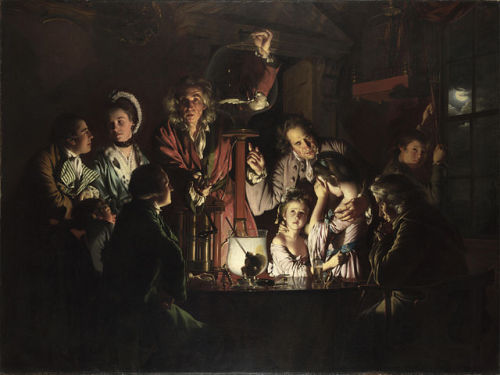*Joseph Wright of Derby, An Experiment of a Bird in an Air Pump (1768)*
The speckled wall shows an interesting
shadow play of figures rushing from one room to the next. The low moanings of a girl are
punctuated with the occasional sputter of a candle. A little boy is made to
stand guard at the front door, in anticipation of the imminence of the local
doctor and his company, a proverbially ingenious apothecary. He has yet
witnessed the current state of his bedridden sister- “It’s grave, it’s grave…,”
comes the muttering of his father- and he can picture himself doggedly refusing
to open his eyes if he was in the room. But anything could be worse than his
imagination. And within the blink of an eye the moanings could seize.
The doctor
raised slightly his eyebrows whilst feeling the girl’s faint breath caress his
fingers like veil. The family bends over to read the doctor’s facial
expressions but with no avail- the intricate web of indentations and wrinkles
have made his face inscrutable. The apothecary’s is even more enigmatic: a
clownish smile is constantly on his face as if he was buoyed by every sign of
the girl’s affliction. He has been rapt in scribbling on a little notebook
since he entered the house; not even prompted by any instructions of the doctor
since the latter remains almost silent throughout. The little boy, still refusing
to come close to the sickroom, pricks his ears lest any telling news might
escape him. But he hears nothing. He wonders if it is because of the rain.
The family
sees the apothecary tending to the medicine like a conjuror exhibiting his
magic. The whole event now turns abruptly to a fascinating entertainment. All
watch jaw-dropped as the apothecary opens his arms heavenward, invoking spirits
of all manner and corralling the earthly elements into the medicine he creates.
Everyone is so arrested by this grotesque performance that no one is aware of a
stout, diminutive figure, approaching tentatively to the bed. It happens on a
moment of respite between the incessant ecstasies that plague yet excite the
girl so. The girl smiles wanly to her brother, who stands transfixed and eyes
destitute of emotions. He hopes the pain will end just like a single stroke on
the neck in the bygone days. And birds will skid over the sky in throngs before
the clouds cleared. All will be over.
The parents
try to force the medicine into the girl’s mouth but the strong smell makes her
retch. Her strength is no rival to the other healthier ones and resistance
seems helpless. Without any cajoling the medicine is poured into her trembling
mouth. The liquid is so golden that the room is suddenly lightened up, and the
boy can see clearly the contortions of his sister before the medicine is
consumed, and the room back to its original darkness. The parents whisper their
prayers before tugging their girl back to bed, who is now panting heavily but
seizes writhing her body in agony as she did minutes ago. The apothecary, still
with a clownish smile, assures the family that by tomorrow everything will be
fine. The doctor responds nothing but stares at the girl with an arched
eyebrow. This time only the little boy catches the sign. He doesn’t know what
the say to his sister even in a pinch. A new day will soon dawn. Even when the
little boy senses the first light sifting through the windows, and the candle
dwarfs itself to hand out authority, words fail on his lips. He can only wait
and see everything happen.

Comments
Post a Comment